

How COVID-19 changed NASA culture. Unexpected Leadership Lessons Are Covid's Surprising Side Effect. Piercing headaches that last months.

Frantic efforts to write succession plans and check life insurance policies. FaceTime goodbyes with loved ones who didn't make it. Business owners are still grappling with the fear, confusion, and human destruction wreaked by the Covid pandemic. For many of those who struggled firsthand with the virus, they say the experience has left lasting effects. So-called long-haul survivors say they still haven't fully regained their health, even as they must continue to keep their businesses running. Inc. recently spoke with four entrepreneurs about their experiences and how Covid has changed them as leaders. Pandemic leadership: Lessons from New Zealand’s approach to COVID-19 (26 May 2020)
Introduction: Yes, leadership matters As a critically oriented leadership scholar, I have long had a somewhat ambivalent relationship with my object of analysis.
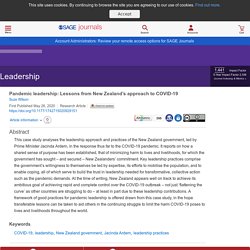
On the one hand, I’m generally both wary – and weary – of heroic narratives which attribute exceptional outcomes to the will and skill of individual heads of state or CEOs while ignoring the swathe of other contributors and contextual factors that are routinely at play when something difficult to achieve is accomplished. And, on the other hand, I am also much influenced by both research and personal experience that indicates poor leadership is both woefully commonplace and very harmful and that, in contrast, good leadership can indeed make a real difference to both organisations and societies.
The potentially life-altering consequences of good or poor leadership have, for many of us, likely never been quite so starkly apparent than at present. New Zealand’s approach to COVID-19 thus far Results to date Figure 1. Why Do COVID-19 Death Rates Differ Wildly from Place to Place? While the average number of COVID deaths per million people, as of January 20, stands at 266 globally, many countries are well below or above that number.

In South Korea, the number is 25 deaths per million, and in Australia, it’s 36. Yet in Italy, they’re experiencing 1,384 deaths per million people, in the United Kingdom 1,377, and in the United States 1,277. Similar differences are apparent in deaths per 100,000 people across U.S. states. Nine Leadership Lessons 2020 Gave Us. As we approach these final days of 2020, a year that has tested our society like few others in recent memory, it’s safe to say that many people are looking forward to putting this year behind them.
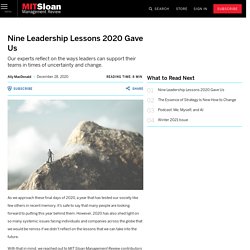
However, 2020 has also shed light on so many systemic issues facing individuals and companies across the globe that we would be remiss if we didn’t reflect on the lessons that we can take into the future. With that in mind, we reached out to MIT Sloan Management Review contributors who study leadership up close with the following question: What lessons can managers take from 2020 and put into practice in the coming year? Given their diverse research experience and backgrounds, our authors were able to offer numerous insights for how leaders at all levels in an organization can commit to caring, foster supportive work cultures, and forge new paths in 2021. Get weekly updates on how global companies are managing in a changing world. Please enter a valid email address. The Top 7 Ways to Be an Effective Leader During A Pandemic. By Angeline Licerio The pandemic is continuing to alter businesses.
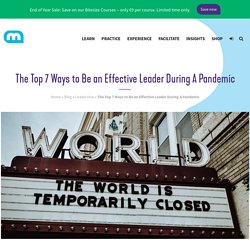
It’s ravaging the economy in many nations and changing the normal way of working. Even government and national or state leaders are caught off-guard. It seems that almost everyone is trying to cope with the challenges and the pandemic’s impact on health, livelihood, jobs, food security, and more. How the chaos of 2020 will shape the next decade, according to 8 design experts. COVID Response Center. Lessons from Covid: What we learned and how life changed. 10 Leadership Lessons from Covid Field Hospitals. The pandemic has forced leaders of hospitals around the world to adopt new practices as they have struggled to contend with the crisis.
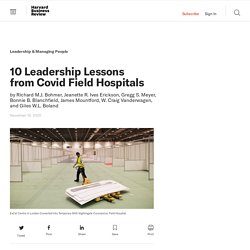
In this article, the senior leaders of two emergency field hospitals in the United kingdom and the United States —... Crisis Response: Insights From A Leadership Team Who Did It Well. By Jimmy Leppert, Managing Director + Rod Walker, President of Consulting In the world of complex changes, a global pandemic easily outranks any number of other highly nuanced circumstances that organizations must maneuver within and around.
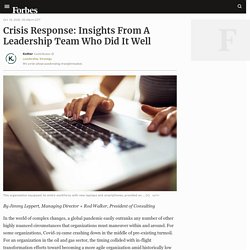
For some organizations, Covid-19 came crashing down in the middle of pre-existing turmoil. For an organization in the oil and gas sector, the timing collided with in-flight transformation efforts toward becoming a more agile organization amid historically low oil and gas markets, workforce reductions and now – Covid-19. Yet, incredibly, this organization’s crisis response to the pandemic are examples of what leaders should do when navigating the murky early stages of any crisis. Their behaviors, actions and mindsets enabled the organization to establish a new normal and drive value – right now and into the future.
A Strategy for Today + A Strategy for Tomorrow. CEOs Reflect on Leadership in Perilous Times. In our conversations with more than 100 CEOs about leading through the crisis, they emphasized six themes that are consistent with what we found in our long-term study on CEO performance.
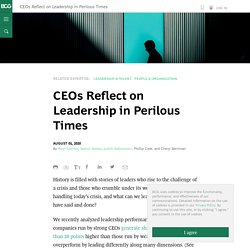
We heard many stories emphasizing the importance of purpose as a guide to action, a long-term approach to strategy, and the tracking of high-frequency signals. Since the crisis began, most CEOs have spent even more energy taking care of their people, communicating authentically, and honing their own leadership abilities. Purpose Guides Action Purpose anchors an organization’s day-to-day activities to a higher goal. Bilan d'une crise - Six mois plus tard... Article publié dans l'édition Automne 2020 de Gestion Après avoir affronté la première vague d’une pandémie aux répercussions sans précédent, le monde des affaires tire des leçons des derniers mois.
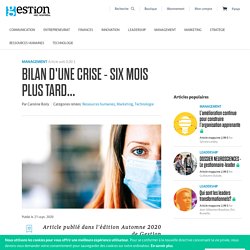
Alors que nous nous apprêtons à traverser un automne qui s’annonce riche en rebondissements, comment pouvons-nous nous projeter dans l’avenir? Quelles pratiques la crise de la COVID-19 a-t-elle remises en question ou propulsées à l’avant-plan? Bill Gates Says the Pandemic Has Set Us Back 25 Years. What It Will Take to Change That. The Gates Foundation released its annual Goalkeepers Report, an assessment of progress in a variety of development goals determined by world leaders.
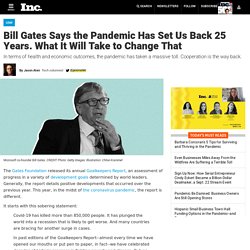
Generally, the report details positive developments that occurred over the previous year. This year, in the midst of the coronavirus pandemic, the report is different. Preventing future waves of COVID-19. Special Report COVID-19: Facts and Insights, October 30 COVID-19: Briefing note #44, March 3, 2021. Taking Stock of the Covid-19 Recession. Executive Summary Where are we, six months into the coronavirus recession? The authors look back at five common expectations from the early days of the crisis and how they differ from where we are today. The differences in macroeconomic outcomes can largely be explained by countries’ health care and economic policies.
Perhaps surprisingly, the authors found that aggressive economic policy can offset shortcomings in health care policy. A blueprint for remote working: Lessons from China. From Alibaba to Ping An and Google to Ford, companies around the globe are telling staff to work from home in a bid to stem the spread of COVID-19. Such remote working at scale is unprecedented and will leave a lasting impression on the way people live and work for many years to come. China, which felt the first impact of the pandemic, was an early mover in this space. As home to some of the world’s largest firms, it offers lessons for those that are just now starting to embrace the shift. Working from home skyrocketed in China in the wake of the COVID-19 crisis as companies told their employees to stay home. Around 200 million people were working remotely by the end of the Chinese New Year holiday.
This article brings together our experience helping clients navigate remote working, in-house analysis, and insights from conversations with executives in China as they responded to the situation and addressed the challenges. Fonctionnement collectif : comment (re)mobiliser à partir de l'expérience récente ? Au lendemain de la crise sanitaire et du déconfinement, j’ai eu l'occasion d’interviewer des dirigeants d’entreprises en juin et juillet 2020. L’objectif de ces entretiens était de : comprendre ce qui s’est joué pendant la période en termes de fonctionnement collectif, identifier les enjeux réels pour ces dirigeants, et clarifier les leviers d’action à disposition de chacun. How COVID changed the CEO skillset. Why capabilities are key in the postpandemic era. One silver lining of the COVID-19 crisis has been to show businesses how to manage better and achieve greater speed, quality, and cost control.
A wartime mindset—defined by decisive crisis management, scenario planning, and a human reflex attuned to the economic and health shocks affecting employees—has been the hallmark of leaders in the crisis so far. Now, as the world feels its way toward recovery and the new opportunities of the next normal, another risk looms. It is that inertia will set in, along with a longing for a return to the operating style of the days before COVID-19.
How can leaders avoid the impulse to abandon the progress they have made in shaping a more productive and competitive company profile? We believe the answer is a renewed focus on people and their capabilities. Why do we believe this? This means understanding what information is relevant, encouraging simpler approval chains, and scrambling to put the best talent against critical challenges. 1. COVID-19 and World War 2. Two months after Germany surrendered, Britain held a general election. “And now win the peace,” exhorted the Labour Party, which promised massive social and economic change. The words struck a chord and Labour won big, sweeping Winston Churchill out of leadership. Western Europe, Japan, and the United States did win the peace, enjoying more than two decades of broad-based economic growth that not only raised living standards and brought a better quality of life to their citizens but also helped to fuel global growth (Exhibits 1 and 2).
We strive to provide individuals with disabilities equal access to our website. What you can learn from history about innovating during a crisis. 5 Ways Covid-19 Changed Leadership Forever. Employee Liability Waivers: What to Consider. Many businesses are considering requiring employees to sign liability waivers as a condition of returning to work. These waivers ask employees to acknowledge and bear the potential health risks of contracting Covid-19 on the job. Lessons from Chinese Companies’ Response to Covid-19. The past four months have provided an opportunity to study a once-in-a-lifetime moment — how companies function during an unprecedented global pandemic while also navigating an accelerated shift to digital operations.
Pandemic leadership: Lessons from New Zealand’s approach to COVID-19 (2020) What Donald Trump’s response to COVID-19 teaches us: It’s time for our romance with leaders to end (2020)